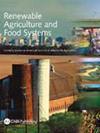The potential for using wood mulch for agricultural production
IF 2
3区 农林科学
Q2 AGRICULTURE, MULTIDISCIPLINARY
引用次数: 0
Abstract
Abstract Making woody mulch (WM) from organic waste is one solution for repurposing waste. Our work had two primary objectives. First, we wanted to destermine the current use of WM as a soil cover, barriers to use, benefits, and possible motivations for adopting the use of WM by home and commercial growers for cultivating crops in Barbados and the Baltimore-Washington, DC metropolitan region in the USA. To accomplish this objective, we administered a survey to growers in both regions. Second, we wanted to determine the benefits of using WM in agricultural production for sweet potatoes (both regions) and Hungarian hot wax peppers (USA). We measured whether WM influenced crop survival, crop yield, crop nutrients, weed mass, and soil characteristics in replicated plots covered with a layer of WM or left bare. Growers reported that expense, availability, and ease of application were barriers to using WM. Despite the barriers, many growers were using, or had previously used, WM and reported myriad benefits, including improving plant yield and/or nutrients, preventing weed growth, maintaining soil moisture and reducing irrigation needs, improving soil fertility, reducing soil erosion, reducing compaction from heavy rain, and maintaining soil temperature. Our data from replicated field trials verified some of the potential benefits reported by growers. WM in some cases promoted higher crop survival and yield of sweet potatoes, suppressed weeds, conserved soil moisture, and maintained higher soil temperature. Understanding which crops benefit from WM and the longer-term effects of WM on crops and soil are deserving of future study.在农业生产中使用木质地膜的潜力
利用有机废物制作木质地膜(WM)是废物再利用的一种解决方案。我们的工作有两个主要目标。首先,我们想要确定WM作为土壤覆盖物的当前使用情况、使用障碍、效益,以及在巴巴多斯和美国巴尔的摩-华盛顿特区大都会区,家庭和商业种植者采用WM种植作物的可能动机。为了实现这一目标,我们对这两个地区的种植者进行了调查。其次,我们想确定在红薯(两个地区)和匈牙利热蜡辣椒(美国)的农业生产中使用WM的好处。在覆盖了一层WM或未覆盖WM的重复地块上,我们测量了WM是否影响作物存活、作物产量、作物养分、杂草质量和土壤特征。种植者报告说,费用、可用性和易于应用是使用WM的障碍。尽管存在障碍,许多种植者仍然在使用或曾经使用过WM,并报告了无数的好处,包括提高植物产量和/或养分,防止杂草生长,保持土壤水分和减少灌溉需求,提高土壤肥力,减少土壤侵蚀,减少大雨造成的板结,保持土壤温度。我们来自重复田间试验的数据证实了种植者报告的一些潜在效益。在某些情况下,WM提高了甘薯的成活率和产量,抑制了杂草,保持了土壤水分,保持了较高的土壤温度。了解哪些作物受益于WM以及WM对作物和土壤的长期影响值得未来的研究。
本文章由计算机程序翻译,如有差异,请以英文原文为准。
求助全文
约1分钟内获得全文
求助全文
来源期刊

Renewable Agriculture and Food Systems
农林科学-农业综合
CiteScore
5.20
自引率
7.40%
发文量
39
审稿时长
>36 weeks
期刊介绍:
Renewable Agriculture and Food Systems (formerly American Journal of Alternative Agriculture) is a multi-disciplinary journal which focuses on the science that underpins economically, environmentally, and socially sustainable approaches to agriculture and food production. The journal publishes original research and review articles on the economic, ecological, and environmental impacts of agriculture; the effective use of renewable resources and biodiversity in agro-ecosystems; and the technological and sociological implications of sustainable food systems. It also contains a discussion forum, which presents lively discussions on new and provocative topics.
 求助内容:
求助内容: 应助结果提醒方式:
应助结果提醒方式:


